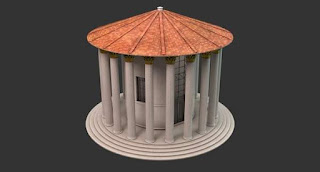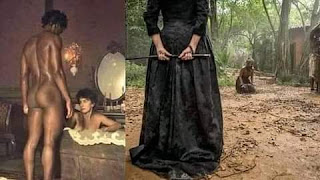The Temple of Hercules Victor/Olivarius
The Temple of Hercules Victor/Olivarius
It was commissioned by Marcus Octavius Herennius, a wealthy olive oil wholesale merchant. According to the legend, it was dedicated to Hercules because he had dreamed of him after he survived a pirate attack while shipping oil from Africa.
He was a "negotiatores oleari" an oil negotiator, a stock player in the olive oil exchange market corporation, the "arca olearia".
They were the only ones authorized to treat and trade olive oil.
The gens Herennia was a plebeian family of Samnites nobility origin who joined the Roman Republic during the Samnite Wars (343-290 BC) and spread around south Italy and later Africa. They were important traders of Oil and then of Silphium. Among the most notable descendants were two brothers who became emperors in 251 AD.
The temple was built around 120 BC in the Forum Boarium, the largest market of Rome, besides the Portus Tiberinus, the first commercial harbor of Rome and near the Pons Aemilius, the first masonry bridge in Rome.
(It was probably built by the greek architect Hermodorus of Salamis who, in 146 BC, rebuilt the temple of Jupiter Stator, the first marble temple ever built in Rome)
Probably the first circular roman temple ever built, defined as monopteros-peripteros or thòlos. This kind of temple in the roman cities was often built in the center of the măcellum, the commercial marketplace for meat, fish, vegetables, herbs and oil.
Is the earliest surviving marble building in Rome and the only temple built with Greek marble, obtained after the Roman conquest of Athens. The temple was probably designed by a Greek architect and built by Greek slaves. Inside there was the Hellenic gilded bronze statue of Hercules, naked with his club of wild olive tree wood.
The Greek myth has it that Hercules brought down the first wild olive tree from heaven and planted it in the city of Olympia, and after he established the Olympic Games in honor of Zeus, he created the "kotinos", the wreath made with that wild olive tree branches, used to crown the athletic, musical and poetic winners.
Hercules was the protector of social justice, merchants, commerce, houses, warriors, shepherds, health, springs, healthy waters, sexuality and female fertility.
It is also known that the first action of the freed gladiators was to dedicate their weapons to him by pinning them down on his temple.
The club of Hercules was also used by Roman women as a popular amulet-jewel.
-----------------------------
Roman Oilive oil:
The myth has it that Romulus and Remus were born right under an olive tree.
The olive plantations were too important to be abandoned, in fact citizens who had more than 2,500 square meters of olive trees were among the very few to be exempt from military service.
Olive oil was an indispensable product in the ancient Romans daily life, used by all social classes. The extra virgin oil was not only used it for seasoning, cooking, frying or making sauces but they had different kinds used as fuel for lighting lanterns; as unguent for healing wounds or bathing, protect, clean, massage and moisturize the skin at the spas (then the filthy oil was collected and sold as a medicine); for religious offerings and various perfumed oils.
There were also oils of almond, laurel, walnut, rose and more.
The olives were kept in oil, in vinegar, in salt, in brine or as olive jam.
-----------------------------
At that time: the Republic of Rome had conquered Carthage and Macedonia a few decades earlier, owning all the mediterranean sea, enriching itself with food, mines, treasures and knowledge. Spain had already been conquered and now they also conquer Transalpine Gaul (southern France); some Germanic tribes cross the Danube meeting the Romans for the first time.
In Rome the reforms of the Gracchi brothers cause violent wars and then their death, as well as about 3000 of their followers; continues the opposition to give the Italian allies Roman citizenship which will lead to the social war; Gaius Marius begins to get noticed as one of the greatest generals of the time and he will be the protagonist of the first Roman civil war; Aurelia Cotta mother of Julius Caesar was born; the first two masonry bridge in Rome, the Aemilius (142BC) and the Milvio (110BC) ones are built.
From Greece to Rome, after Diogenes of Babylon, it is the highest apex of the Stoic school, with Antipater of Tarsus, Dionysius of Cyrene, Panezio and Marco Vigellio. Hipparchus dies and Antiochus of Ascalon is born, the future master of Cicero.
























Comments
Post a Comment